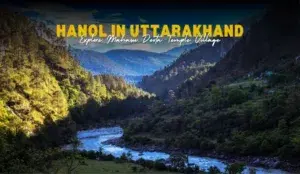Milam Glacier Trekking Guide-If you’re an adventure enthusiast and a nature lover, then the Milam Glacier trek should be on the top of your bucket list.
Nestled in the breathtaking landscapes of the Himalayas, the Milam Glacier offers an unparalleled trekking experience that takes you through stunning vistas, ancient villages, and an up-close encounter with a magnificent glacier.
In this comprehensive guide, we’ll take you through all the essentials you need to know for an unforgettable Milam Glacier trekking adventure.
Introduction to the Milam Glacier Trek
The Milam Glacier trek is a mesmerizing expedition that allows trekkers to delve into the heart of the Himalayas.
Situated in the Kumaon region of Uttarakhand, India, this trek offers a unique blend of natural beauty, adventure, and cultural exploration.
As you embark on this journey, you’ll be treated to awe-inspiring landscapes, diverse flora and fauna, and an opportunity to interact with local communities.
Location of Milam Glacier
The Milam Glacier is situated in the Kumaon region of Uttarakhand, which is a state in northern India. Specifically, it is located in the eastern part of Uttarakhand, near the border with Tibet, which is an autonomous region of China.
The glacier can be accessed from the town of Munsyari, which is the starting point for the trek to reach the glacier. This town is nestled in the Himalayan mountains and serves as a gateway for adventurers looking to explore the beauty of the Milam Glacier and its surroundings.
Exploring the Location: Milam Glacier on the Map
How to Reach
When planning your adventure to the Milam Glacier, you have several travel options to consider:
1. By Road:
- Start your journey by road from cities like Almora or Nainital in Uttarakhand.
- Enjoy a scenic drive through winding mountain roads, passing charming villages and picturesque landscapes.
- Traveling by road allows you to take in the beauty of the region at your own pace.
2. By Flight:
- -Fly to Pantnagar Airport, the nearest airport to Munsyari.
- Pantnagar Airport is well-connected to major Indian cities.
- From Pantnagar, continue your journey by hiring a taxi or taking a bus to Munsyari, the base for the Milam Glacier trek.
3. By Train:
- The nearest major railway station is Kathgodam.
- Reach Kathgodam by train from various cities across India.
- From Kathgodam, proceed to Munsyari by road, enjoying the scenic drive through the mountains.
- Whichever mode of transportation you choose, your adventure to the Milam Glacier promises to be a remarkable and unforgettable experience.
Preparing for the Expedition
Physical Fitness and Health Considerations
Undertaking the Milam Glacier trek requires a good level of physical fitness. The trail encompasses various terrains, including steep ascents and descents, rocky paths, and snow-covered stretches.
Before the trek, it’s advisable to engage in a fitness regimen that includes cardiovascular exercises, strength training, and endurance building. Consulting a medical professional and undergoing a thorough health check-up is essential to ensure you are physically prepared for the challenges ahead.
Necessary Permits and Permissions
To embark on the Milam Glacier trek, trekkers need to obtain the required permits and permissions. These permits are typically issued by the local authorities and are necessary to access the restricted areas along the trail.
It’s recommended to apply for these permits well in advance and adhere to all regulations to ensure a smooth and hassle-free trekking experience.
Packing List: What to Bring
Packing strategically is crucial for a successful trek. Your backpack should include essentials such as comfortable trekking clothes, sturdy hiking boots, a sleeping bag, a first aid kit, water bottles, high-energy snacks, a map, and a compass.
It’s important to pack light while ensuring you have all the necessary items to stay comfortable and safe throughout the journey.
Key Facts About the Milam Glacier Trek: Exploring the Himalayan Marvel
Embarking on the trek to Milam Glacier unveils a world of natural wonders and cultural richness. Here are some key facts to enhance your understanding of this captivating adventure
Location and Accessibility
- Milam Glacier is nestled in the Kumaon region of Uttarakhand, India, near the border with Tibet.
- The trek begins from Munsyari, a picturesque town that serves as the gateway to this remarkable journey.
Altitude and Distance
- The trek spans approximately 50 to 60 kilometers round trip, leading you to an altitude of around 13,000 to 14,000 feet.
- The gradual ascent allows for acclimatization, ensuring a safer and more enjoyable experience.
Duration and Itinerary
- The trek typically takes around 7 to 8 days to complete, allowing for a comfortable pace and ample time for exploration.
- The itinerary covers a variety of terrains, from meadows to forests and quaint villages, culminating in the awe-inspiring Milam Glacier.
Cultural Interactions
- The trail passes through remote villages, providing opportunities to engage with locals, learn about their traditions, and participate in local festivals.
- This cultural immersion adds a unique dimension to the trek, fostering a deeper connection with the Himalayan communities.
Natural Beauty
- The trek offers breathtaking views of snow-capped peaks, alpine meadows, and dense forests.
- Trekkers are treated to the sight of the magnificent Milam Glacier, a sprawling expanse of ice and snow that captivates the senses.
Permits and Guidance
- Obtain necessary permits from local authorities before starting the trek to ensure compliance with regulations.
- Hiring a local guide is recommended for route navigation, safety, and enriching insights into the region.
Physical Preparation
- Prior physical fitness and endurance training will contribute to a more comfortable and successful trekking experience.
- Acclimatization in Munsyari before beginning the trek helps minimize altitude-related challenges.
Environmental Responsibility
- Adhering to Leave No Trace principles ensures minimal impact on the environment and preserves natural beauty for future generations.
Best Time to Embark on the Milam Glacier Trek: Seasonal Delights and Temperature Insights
Planning your adventure to the Milam Glacier involves choosing the ideal time of year to experience the breathtaking beauty of the Himalayas. Each season offers a unique perspective, and understanding the temperatures can help you prepare for a comfortable and enjoyable trek.
Spring (April to June):
- Spring is one of the best times to undertake the Milam Glacier trek.
- Temperatures during this season are mild and pleasant, with daytime temperatures ranging from 10°C to 15°C (50°F to 59°F) at lower altitudes.
- As you ascend, temperatures may drop to around 5°C (41°F) or lower at higher altitudes.
- The snow begins to melt, revealing lush meadows and blooming flowers, enhancing the visual appeal of the landscape.
Summer (July to September):
- The summer months bring the monsoon season to the region.
- While the trail may be less crowded during this time, trekking can be challenging due to heavy rainfall, slippery paths, and potential landslides.
- Daytime temperatures range from 15°C to 20°C (59°F to 68°F) at lower altitudes, and nights are cooler, around 5°C to 10°C (41°F to 50°F).
Autumn (October to November):
- Autumn is another favorable season for the Milam Glacier trek.
- Temperatures start to cool down, with daytime temperatures ranging from 5°C to 10°C (41°F to 50°F) at lower altitudes.
- Higher altitudes experience even lower temperatures, possibly dropping to freezing levels.
- The landscape is characterized by clear skies and breathtaking views, making it an excellent time for photography and enjoying the scenery.
Winter (December to March):
- Winter brings cold temperatures and heavy snowfall, making the trail inaccessible and risky for trekking.
- The temperatures can plummet to sub-zero levels, particularly at higher altitudes.
- Snow blankets the landscape, creating a picturesque but challenging environment.
Reaching the Base Camp
Route Options and Transportation
The journey to the Milam Glacier begins in the picturesque town of Munsyari. Depending on your starting point, there are different route options to reach Munsyari, including road travel and flights.
From Munsyari, the trek takes you through charming villages and pristine forests, providing a glimpse of local life and culture.
Acclimatization and Altitude Challenges
Acclimatization becomes essential when you climb to higher altitudes. Spend a couple of days in Munsyari to acclimatize before beginning the trek.
This lowers the possibility of ailments brought on by high altitude. Listen to your body, stay hydrated, and avoid overexertion to ensure a safe transition to higher altitudes.
Trekking Itinerary
Day 1: Base Camp to First Halt – Exploring Munsyari
Your journey commences with a leisurely walk around Munsyari. Explore the local market, interact with residents, and get a feel for the region’s culture. It’s an ideal way to ease into the trekking experience.
Day 2: Munsyari to Lilam Village
The trek officially begins as you leave Munsyari behind and make your way to Lilam Village. The trail introduces you to the beauty of the Himalayan landscapes, with dense forests and charming streams accompanying your journey.
Day 3: Lilam Village to Bugdiyar
Today’s trek involves crossing the Gori Ganga River and navigating through rhododendron forests. The path offers breathtaking views and a gradual change in scenery.
Day 4: Bugdiyar to Martoli Village
Trekking alongside the Gori Ganga river, you’ll arrive at Martoli Village – a serene settlement that provides insights into the local way of life.
Day 5: Martoli Village to Milam Village
As you approach Milam Village, the landscape transforms, offering stunning views of peaks such as Hardeol and Trishuli.
Day 6: Milam Village to Milam Glacier and Back
The highlight of the trek awaits as you journey to the Milam Glacier. Witness the glacier’s grandeur and take in the surrounding natural beauty before returning to Milam Village.
Day 7: Return Trek to Munsyari
The return journey retraces your steps, allowing you to relish the sights you encountered on the way to the glacier.
Savoring the Natural Beauty
Flora and Fauna Along the Trail
The Milam Glacier trek exposes you to a diverse range of flora and fauna. Keep an eye out for Himalayan flowers, juniper trees, and various bird species that call this region home.
Breathtaking Views: Nanda Devi and Surroundings
Throughout the trek, you’ll be treated to captivating views of the Nanda Devi peak and its neighboring mountains. These vistas offer a sense of awe and inspiration that make the journey truly unforgettable.
Cultural Encounters
Villages En Route: A Glimpse into Local Life
The trail meanders through remote villages, offering a chance to engage with friendly locals and delve into their distinctive traditions and lifestyles.
This cultural immersion allows trekkers to gain insights into age-old customs while forging meaningful connections with the hospitable communities along the way.
Interacting with villagers unveils a rich tapestry of heritage, granting a deeper appreciation for the region’s diversity and the warmth of its inhabitants.
Traditions and Customs of the Region
Dive into the diverse cultural tapestry of the Himalayan people. Engage in heartfelt conversations, partake in vibrant local festivals, and unlock profound insights into enduring age-old customs.
Immerse yourself in the captivating essence of tradition, gaining a profound appreciation for the heritage that has gracefully endured the passage of time.
This immersive experience allows you to connect deeply with the local way of life, fostering a sense of unity and leaving you with cherished memories of your journey through this enchanting region.
Challenges and Rewards
Facing the Rigors of High-Altitude Trekking
The Milam Glacier trek presents its share of challenges, including unpredictable weather, rugged terrains, and high altitudes.
Overcoming these challenges rewards you with a sense of accomplishment and a deeper connection with nature.
Immersing in the Serenity and Solitude
One of the greatest rewards of the trek is the opportunity to disconnect from the hustle and bustle of modern life. The serene surroundings and solitude allow for introspection and a rejuvenating experience.
Conclusion
Trekking in the Milam Glacier region is an opportunity to forge a deep connection with nature, challenge your limits, and immerse yourself in the rich cultural tapestry of the Himalayan communities.
As you journey through ancient villages, lush valleys, and towering peaks, you’ll discover a sense of wonder and awe that only the Himalayas can evoke.
FAQs-
Q1: How difficult is the Milam Glacier trek?
A: The Milam Glacier trek is considered moderately challenging, with varying terrain and high altitude segments. Proper preparation and physical fitness are essential.
Q2: What is the best time to undertake this trek?
A: The ideal time for the Milam Glacier trek is during the summer months of May to June and September to October, when the weather is relatively stable and the trail is accessible.
Q3: Are there any age restrictions for the trek?
A: While there is no strict age limit, participants should be in good physical health and able to cope with the demands of trekking at high altitudes.
Q4: Is it necessary to hire a guide for the trek?
A: While experienced trekkers may navigate the trail independently, hiring a local guide is recommended for safety, cultural insights, and navigating the route effectively.
Q5: What is the significance of Milam Glacier?
A: Milam Glacier holds both geographical and cultural importance. It is one of the largest glaciers in the Kumaon region and holds religious significance for the local communities.





